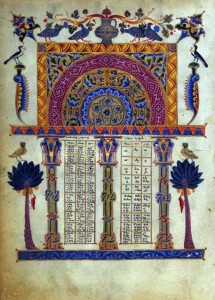The Western Prelacy of the Armenian Apostolic Church of America has filed a $105 million lawsuit against the J. Paul Getty Museum for the return of seven pages ripped out of a 13th century Bible. The church claims the pages were torn from the Armenian Orthodox Church’s Zeyt’un Gospels during the 1915 Armenian genocide and were illegally sold thereafter.
 The Bible was illuminated by T’oros Roslin, the premier Armenian manuscript illuminator of the Middle Ages, in 1256 and was considered not just sacred but magical. It was venerated by Armenian Orthodox for its powers of protection. In fact, when the dark days of the genocide dawned in 1915, the entire hierarchy of the Armenian church carried the Bible in a procession through every street of Zeyt’un to create a divine firewall of protection around the city. (It didn’t work.)
The Bible was illuminated by T’oros Roslin, the premier Armenian manuscript illuminator of the Middle Ages, in 1256 and was considered not just sacred but magical. It was venerated by Armenian Orthodox for its powers of protection. In fact, when the dark days of the genocide dawned in 1915, the entire hierarchy of the Armenian church carried the Bible in a procession through every street of Zeyt’un to create a divine firewall of protection around the city. (It didn’t work.)
Some time after that, the Bible was given to descendants of the Armenian royal family because they had connections with the ruling Ottoman Turks that might keep them safe from deportation, or at least, you know, alive. They loaned it to a family friend but were suddenly deported, and thereafter the Bible moved around for the rest of World War I and in the immediate post-war period. Finally it surfaced again in 1928 and was returned to the Patriarchate of the Armenian Church. They asked the family friend who had held it for years to authenticate it in 1948, and upon its return the missing 7 pages were discovered.
To this day nobody knows who stole the pages. All we know is they turned up on display at the Pierpont Morgan Library in New York City in a 1994 exhibit called “Treasures in Heaven: Armenian Illuminated Manuscripts”, on loan from an anonymous private collector. That’s when they came to the Getty’s attention. The Getty bought the pages from the still-anonymous collector and have had the pages ever since. I like how vague they are about the pages’ bloody history on their website: “These canon tables were separated from the manuscript at some point in the past and eventually acquired by the Getty Museum….”
Separated from the manuscript. Like they got a divorce or lost at the mall or something. Getty representatives don’t mince quite so many words in their response to the suit, though.
“The Getty is confident that it has legal ownership of these pages, known as Canon Tables, which have been widely published, studied and exhibited,” the museum’s spokeswoman, Julie Jaskol, said in a statement. […]
“At no time in the 90 or so years that the Canon Tables have been in the United States has anyone questioned their ownership,” Jaskol said in the statement. “The Getty believes the lawsuit is groundless and should be dismissed.”
The plaintiff’s lead attorney, Vartkes Yeghiayan — who often represents victims of the Armenian Genocide — was researching the atrocity when in 2007 he discovered the Getty Museum was housing the pages, said Michael Bazyler, a Chapman University law professor speaking on behalf of the attorney.
“We have asked the Getty to give it back to the church, but they declined to do so,” he said.
The rest of the Bible is in the Mesrop Mashtots Institute of Ancient Manuscripts in Yerevan, Armenia, where it has been kept since 1948. The plaintiffs want the 7 stolen pages returned to Armenia so they can be restored, or at least kept together with the Bible itself.
The Getty’s rationale — that the pages were published extensively from 1994 on and nobody questioned the legal title so therefore their sale was legal — is something you see a lot when museums justify shady acquisitions. Something hides in a private collection for a few years/decades, then is loaned to a famous institution where it gets published thereby establishing provenance. It’s a looted antiquities laundering system, basically.
The shadiness is old enough, however, that it most likely falls before the 1970 cut-off of the UNESCO Convention on the Means of Prohibiting and Preventing the Illicit Import, Export and Transfer of Cultural Property. We’ll see what the courts say.
TMZ, oddly enough, has a pdf of the entire complaint. It’s an interesting read, with lots of details about the history of the Bible during the genocide.